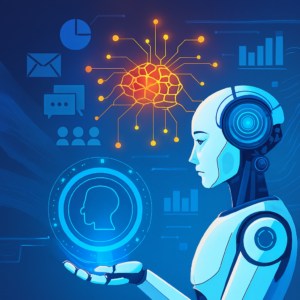CRM Article
Adept Automations: How AI is Transforming CRMs into Thinking Machines
SmallBizCRM Staff – October 17th, 2025
 CRMs (Customer Relationship Management systems) are no longer content just to store data. They are now adapting, learning, and making recommendations, stepping into t proactive decision-making. Welcome to the era of the AI-powered CRM, where systems don’t just respond—they anticipate, evolve, and guide.
CRMs (Customer Relationship Management systems) are no longer content just to store data. They are now adapting, learning, and making recommendations, stepping into t proactive decision-making. Welcome to the era of the AI-powered CRM, where systems don’t just respond—they anticipate, evolve, and guide.
From Passive Storage to Proactive Intelligence
Traditional CRMs have always been excellent repositories of customer histories, interactions, and sales records. But the gap between gathering data and using it smartly has often been wide. With advances in artificial intelligence, that gap is narrowing. CRMs are now leveraging machine learning, natural language processing, and predictive analytics to interpret patterns, spot trends, and suggest the next best action.
Imagine a CRM that notices a customer has viewed your pricing page several times, recently complained about support delays, and abandoned a purchase last week. Rather than waiting for a sales rep to investigate, the system automatically flags this account as high-risk, recommends a targeted outreach, and perhaps even offers a discount. That is not just efficient, it’s intelligent.
Key Features of Smarter CRMs
Here are some of the features that distinguish modern AI-enhanced CRMs:
-
Predictive Lead Scoring and Prioritization
AI models evaluate leads by analysing behavior, engagement data, past purchases, and external signals. The CRM highlights which leads are most likely to convert. Time isn’t wasted following up low-quality leads. -
Personalized Customer Journeys
Rather than one-size-fits-all emails or campaigns, AI-infused CRMs tailor interactions. They adjust messaging, offers, and timing based on individual behavior and preferences. -
Automated Routine Workflows
Repetitive tasks like data entry, report generation, follow-up scheduling, or setting reminders can be offloaded to AI so that team members can focus on strategy, creativity, and human-centric tasks. -
Sentiment Analysis and Natural Language Understanding
By parsing customer feedback via email, chat, and social media, the CRM detects emotional cues. If frustration is building, it escalates to human agents; if praise is abundant, perhaps it surfaces case studies or testimonials. -
Adaptive Learning and Continuous Improvement
AI CRM systems learn from new inputs. As more data comes in, models are retrained, thresholds adjusted, and suggestions refined. Over time, the system gets more accurate in forecasting, in prioritizing, and in recommending actions.
Advantages of These Smarter CRMs
-
Efficiency & Scalability: Because AI handles repetitive tasks, companies save time and reduce human error. Sales and support teams can scale without proportional increases in staffing.
-
Better Customer Experience: Faster response times, tailored communications, and context-aware support make for more satisfied customers who feel understood.
-
Data-Driven Decisions: Organizations gain insights not just into what has happened, but also into what could happen. That opens up strategic moves: identifying churn risk, upsell potential, or customer segments needing different approaches.
-
Proactive Problem Solving: When CRMs spot issues early—say, a drop in engagement—they can trigger interventions before dissatisfaction turns into churn.
Challenges & Considerations
While the benefits are compelling, implementing an AI-powered, semi-autonomous CRM isn’t without pitfalls:
-
Data Quality & Quantity: Poor, incomplete, or biased data can lead to wrong decisions. Garbage in, garbage out holds very true here.
-
Privacy & Ethics: Customers expect data to be handled responsibly. Using personal behavior to drive automated recommendations raises concerns around transparency and consent.
-
Overdependence on Automation: Full automation has limits; human judgment still matters for empathy, ethics, and nuance. The risk is in underestimating things AI can’t meaningfully do.
-
Complexity & Costs: Advanced AI features—training models, integrating multiple data sources, maintaining system updates—can be resource-intensive. Small or lean teams must balance ambition with feasibility.
How to Successfully Deploy a Smart CRM
-
Start with Clear Objectives: Define what you want the CRM to do better. Is your goal faster response times? Lower churn? Higher lead conversion?
-
Ensure Clean, Unified Data: Collect, clean, and unify customer data across channels. Segment relevant signals. Make data governance part of the process.
-
Choose the Right Platform Features: Not all AI is equal. Evaluate vendors based on predictive capabilities, integration ease, user experience, and customization potential.
-
Train Teams and Set Guardrails: People must understand what the AI suggests—and why. Transparency builds trust. Also, have oversight so automated decisions stay aligned with business values.
-
Iterate & Measure: Use metrics, churn rates, time to respond, and conversion percentage to track progress. Monitor what the AI is recommending vs what is happening. Adjust.
Looking Ahead: What’s Next for AI in CRM
-
Autonomous Decision-Making: As AI systems mature, more decisions may be made automatically, e.g., triggering retention campaigns, adjusting prices, or reassigning sales territories, all with minimal human intervention.
-
Integration with Wider Ecosystems: CRM platforms will more tightly interconnect with marketing automation, customer support, finance, and even product usage data so an even fuller picture informs decisions.
-
Explainable AI & Accountability: As AI influences more customer-facing decisions, there will be greater demand for transparency—why did the CRM suggest this? What data drove that?
-
Real-Time Intelligence: From real-time behavior tracking (on apps and websites) to instant feedback loops, CRMs will get smarter at making suggestions in the moment, not days or hours later.
Conclusion
AI-powered CRMs represent a paradigm shift. No longer passive tools, they’re becoming active partners in business success. From predictive lead scoring to real-time sentiment analysis and adaptive workflows, these systems enable smarter, faster, more human-centered outcomes.
If you’re considering upgrading your CRM, think beyond features. . Define the value you need, invest in clean data and ethical practices, and scale in smart ways. Because in a world where customers expect more, a CRM that thinks could be your most valuable teammate.